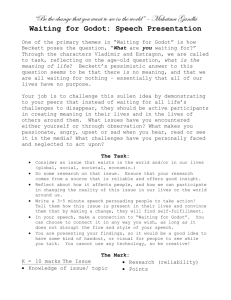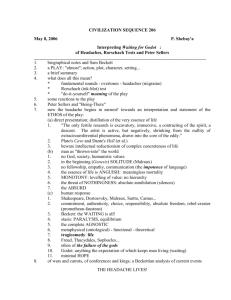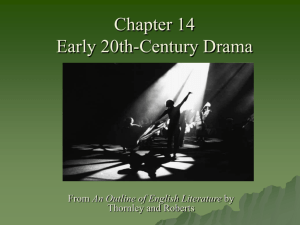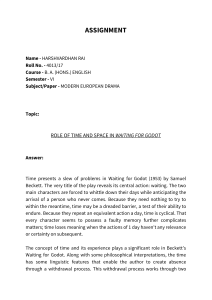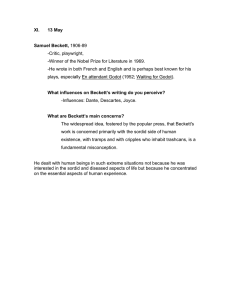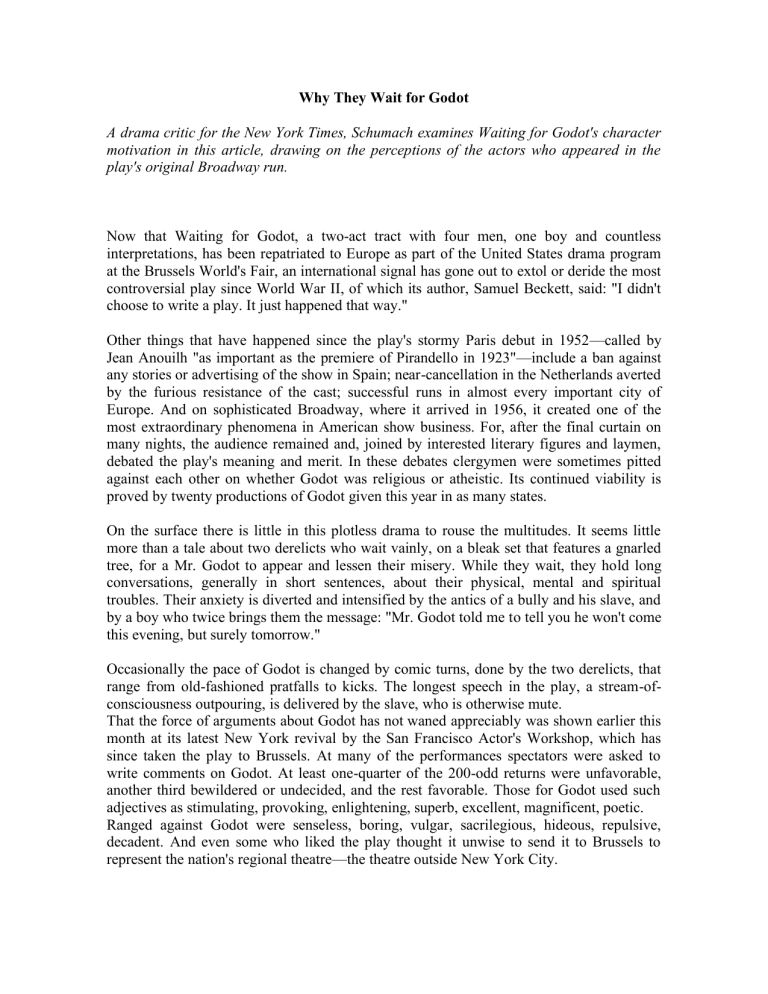
Why They Wait for Godot A drama critic for the New York Times, Schumach examines Waiting for Godot's character motivation in this article, drawing on the perceptions of the actors who appeared in the play's original Broadway run. Now that Waiting for Godot, a two-act tract with four men, one boy and countless interpretations, has been repatriated to Europe as part of the United States drama program at the Brussels World's Fair, an international signal has gone out to extol or deride the most controversial play since World War II, of which its author, Samuel Beckett, said: "I didn't choose to write a play. It just happened that way." Other things that have happened since the play's stormy Paris debut in 1952—called by Jean Anouilh "as important as the premiere of Pirandello in 1923"—include a ban against any stories or advertising of the show in Spain; near-cancellation in the Netherlands averted by the furious resistance of the cast; successful runs in almost every important city of Europe. And on sophisticated Broadway, where it arrived in 1956, it created one of the most extraordinary phenomena in American show business. For, after the final curtain on many nights, the audience remained and, joined by interested literary figures and laymen, debated the play's meaning and merit. In these debates clergymen were sometimes pitted against each other on whether Godot was religious or atheistic. Its continued viability is proved by twenty productions of Godot given this year in as many states. On the surface there is little in this plotless drama to rouse the multitudes. It seems little more than a tale about two derelicts who wait vainly, on a bleak set that features a gnarled tree, for a Mr. Godot to appear and lessen their misery. While they wait, they hold long conversations, generally in short sentences, about their physical, mental and spiritual troubles. Their anxiety is diverted and intensified by the antics of a bully and his slave, and by a boy who twice brings them the message: "Mr. Godot told me to tell you he won't come this evening, but surely tomorrow." Occasionally the pace of Godot is changed by comic turns, done by the two derelicts, that range from old-fashioned pratfalls to kicks. The longest speech in the play, a stream-ofconsciousness outpouring, is delivered by the slave, who is otherwise mute. That the force of arguments about Godot has not waned appreciably was shown earlier this month at its latest New York revival by the San Francisco Actor's Workshop, which has since taken the play to Brussels. At many of the performances spectators were asked to write comments on Godot. At least one-quarter of the 200-odd returns were unfavorable, another third bewildered or undecided, and the rest favorable. Those for Godot used such adjectives as stimulating, provoking, enlightening, superb, excellent, magnificent, poetic. Ranged against Godot were senseless, boring, vulgar, sacrilegious, hideous, repulsive, decadent. And even some who liked the play thought it unwise to send it to Brussels to represent the nation's regional theatre—the theatre outside New York City. Almost as interesting as the reasons for argument about Godot are the lures that bring crowds to see it. Many undoubtedly come because they love the theatre and the play has caused a stir. Others are intellectuals who are curious about a play that is said to have a deeper meaning than that in most dramas. Finally, there are those who are drawn by a sort of egghead snobbery. Godot has been much easier to blame or praise than to explain. One difficulty for its defendants is that the play's Irish-born author, who created the work in French, has not helped them in the few comments he has made about Godot. Thus, when a publisher wrote to him asking for his explanation of the play's symbols, he replied: "As far as I know, there are none. Of course, I am open to correction." And when Sir Ralph Richardson, the British star, asked him if Godot represented God, he replied: "If by Godot I had meant God, I would have said God, not Godot." Thornton Wilder, leader of the pro-Godotians who scrutinize the play's sixty-one pages with the fiery reverence of cabala students, calls the play "a picture of total nihilism'' and a "very admirable work." But, adds Mr. Wilder whose Pulitzer-prize-winning The Skin of Our Teeth also caused a furor, "I don't try to work out detailed symbolism. I don't think you're supposed to." Michael Myerberg, who first produced the play in this country, says: "It very much reflects the hopelessness and dead end we've run into. What he's trying to say is: 'All we have is ourselves—each other—and we may as well make the best of it.'" Bert Lahr, who was in the original Broadway production as Estragon, the derelict who does not know why he's waiting, originally did not know what the play meant. Now he has some unusual interpretations. "The play," he says, "is very complex and has many analyses. But mine is as good as the rest. The two men are practically one—one is the animal side, the other the mental. I was the animal. So far as Pozzo and Lucky [master and slave] are concerned, we have to remember that Beckett was a disciple of Joyce and that Joyce hated England. Beckett meant Pozzo to be England, and Lucky to be Ireland." Mr. Lahr recalls vividly the post-performance seminars: "I remember one night a lady jumped out of her seat screaming: 'What's the difference? What's the difference? We were entertained, weren't we!'" Then there was a woman who came to his dressing room one night. The actor held out his hand to greet her, but all she did was to say: "Oh, Mr. Lahr—" and run off crying. "No, I haven't read anything by Beckett since that play," says Lahr. "I'm not that erudite." E. G. Marshall, whose performance as the other derelict, Vladimir, was as memorable as Mr. Lahr's, attended only one after-theatre symposium. "Then I ran like a frightened deer. I listened to them and thought: 'My God. Is that what the play means?' Every time a mouth opened, out came a different interpretation. That's no good for an actor." In reaching his own interpretation, Mr. Marshall went through a process somewhat different from Mr. Lahr's. "The first time I read the play I thought it was wonderful. That was about a couple of years before I was in it. Then I saw it in London. It was a hit there. But I thought: 'What the hell did I ever see in that play? It's so boring. It's probably nice to read, but it won't play.' "Then Mike Myerberg asked me to be in it here. I went through an evolutionary process. At first we actors used to have violent arguments about what the play meant. And then we'd have violent agreements. Eventually, I saw it in black-and-white terms, I was the intellectual in the play. The play, we agreed, was a positive play, not negative, not pessimistic. As I saw it, with my blood and skin and eyes, the philosophy is: 'No matter what— atom bombs, hydrogen bombs, anything—life goes on. You can kill yourself, but you can't kill life.' "I don't know if it's a great play. But it is a real theatre piece. Not something that has to be molded and hacked to fit in a theatre. The theatre today is too flaccid, too passive, too dull. It is good to have it stirred up by a play like this. I think Waiting for Godot will remain in the theatre and will mean something to succeeding casts and to succeeding audiences." Members of the San Francisco troupe have a variety of ideas about the play. One calls it "a play of despair in which a man is seeking salvation, frustrated in finding it, and incapable of coping with waiting." Another says: "This is a fairly modern state of mind, existential, in which man tries to remove despair and find some strength." A third recalls: "At first I thought it trite. Then I realized that Beckett is a tremendous humanitarian. He does not condemn humanity at any time. He asks mankind to look at itself." A fourth sees Lucky, the slave, as "the sensitive artist in modern society." Those who admire the play for its beauty cite the following speech by Vladimir, when he is urging Estragon to help the fallen Pozzo, the bully: Let us do something while we have the chance! It is not every day that we are needed. Others would meet the case equally well, if not better. To all mankind they were addressed, those cries for help still ringing in our ears! But at this place, at this moment of time, all mankind is us, whether we like it or not. Let us make the most of it, before it is too late! Let us represent worthily for once the foul brood to which a cruel fate consigned us! What do you say? (Estragon says nothing.) It is true that when with folded arms we weigh the pros and cons we are no less a credit to our species. The tiger bounds to the help of his congeners without the least reflection, or else he slinks away into the depths of the thickets. But that is not the question. And we are blessed in this, that we happen to know the answer. Yes, in this immense confusion one thing is clear. We are Waiting for Godot to come. Those who see Beckett as a satiric sage cite the following: "There's man all over for you, blaming on his boots the faults of his feet." Or: "We always find something . . . to give us the impression we exist." Or: "The tears of the world are a constant quantity. For each one who begins to weep somewhere else another stops. The same is true of the laugh. Let us not then speak ill of our generation, it is not any unhappier than its predecessors. Let us not speak well of it either. Let us not speak of it at all. It is true the population has increased." Despite its triumphs in Paris, where it was called En Attendant Godot, and London, Waiting for Godot had to wait for production in the United States and very nearly died on the doorstep. When Myerberg first saw the script, he dismissed it as impossible to produce. Six months later, in London, he changed his mind, while watching a performance. At first he tried it in Miami. It failed dismally. One estimate is that more than half the openingnight audience failed to return after the intermission. But Myerberg, a stubborn man and a gambler, assembled the cast of Lahr, Marshall, Kurt Kasznar and Alvin Epstein, with Herbert Berghof as director. With considerable showmanship, he brought it to Broadway, preceding its opening on April 8, 1956, with an advertisement in this paper which reads: "This is a play for the thoughtful and discriminating theatre-goer. We are, therefore, offering it for a limited engagement of only four weeks. I respectfully suggest that those who come to the theatre for casual entertainment do not buy a ticket to this attraction." The show extended its run to twice the original four weeks. Author Beckett, in one of his rare comments, wrote to the producer: "It is gratifying to learn that the bulk of your audiences was made up of young people. This was also the case in Paris, London and throughout Germany. I must, after all, be less dead than I thought." Though Beckett might be gratified that the San Francisco troupe doing his play in Brussels is also young, he may not think as much of the reason that prompted the company to choose his play. It happened to be the least costly play in the troupe's repertory and the State Department was footing no bill for transportation. The San Francisco company, however, has learned to make ends meet during its trying existence since it was formed in 1952. Nearly all of its ninety-two members—only ten have gone abroad —have to support themselves with other work. Productions are usually presented only on week-ends. Mr. Beckett, too, has faced some tough times. Born in 1906, a graduate of Trinity College, Dublin, where he later took his M.A. and lectured in French, he began wandering around Europe in 1932, settling finally in Paris. He remained in France during World War II, but moved to the Unoccupied Zone. During 1945-46 he was a storekeeper and interpreter with the Irish Red Cross in bombarded Normandy. Before he wrote En Attendant Godot, he did a collection of short stories, More Pricks Than Kicks, a collection of poems, Echo's Bones: a trilogy of novels—Molloy, Malone Meurt and L'Inuomable. Since Godot he has been represented in the theatre by Endgame, a play that has not notably increased his following. Since Beckett is curious about what the young think of Godot, the 8-year-old who plays the part of the boy with the San Francisco troupe was asked his interpretation of the play. He replied: ''Two men are waiting for Godot. They want to hang themselves. Lucky and Pozzo come in, Lucky is the slave and Pozzo is the master. Then I come in. I give them a message. Then I go off. So next day they still want to hang themselves. Pozzo is blind. I come in with the same message." "What do you think," the boy was asked, "happens to the two men afterward?'' ''I think,'' he replied, after a short pause, "that at the way, way, way end, they hang themselves." "Do you think," the boy was asked, "there is a Godot?" "No. There is no Godot," he replied, then picked up his toy battleship and wandered off. Source: Murray Schumach, "Why They Wait for Godot'' in the New York Times Magazine, September 21, 1958, pp. 36, 38, 41.
